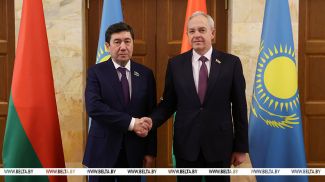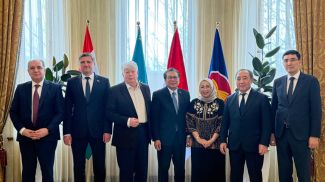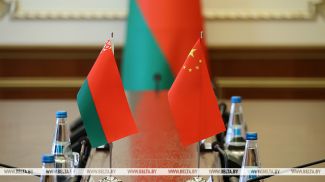MINSK, 6 November (BelTA) – The Belarusian government condemns the attempts to exert political and economic pressure on the country, a sovereign state, member of the Organization for Security and Cooperation in Europe (OSCE), the press service of the Belarusian Ministry of Foreign Affairs told BelTA referring to the statement by Ambassador Extraordinary and Plenipotentiary of Belarus to Austria, Belarus' Permanent Representative to the International Organizations in Vienna Andrei Dapkiunas at the meeting of the OSCE Permanent Council in Vienna.
“Such pressure goes against the spirit of the Helsinki Final Act of 1975 and other founding documents of the organization. The Belarusian delegation deeply regrets that at the OSCE Permanent Council meeting on 17 September the countries invoking the Moscow Mechanism in relation to Belarus did not hear or did not want to hear our call to reconsider their decision,” the ministry said.
“Today the Belarusian delegation has to repeat that the Belarusian government categorically rejects these countries' vision of the situation in Belarus as a reason to launch the mechanism. Our delegation provided detailed information about the situation in the country at almost every meeting of the Permanent Council. At the same time, the initiating countries, failing to utilize all the opportunities to discuss their concerns as part of a political dialogue within the OSCE, invoked the most rigid and confrontational version of the Moscow Mechanism, which actually excludes the possibility of benevolent cooperation between the parties,” the ministry stressed.
The Belarusian Ministry of Foreign Affairs believes that the Moscow Mechanism has become completely outdated and is not an instrument of dialogue and constructive cooperation today. Its non-consensual and in fact confrontational nature contradicts the organization's strategic goals. The main problem of the Moscow Mechanism is that it was designed and probably could have worked in the distant past when the future seemed to many as a happy ‘end of history': the triumph of liberal democracy, the end to the century of ideological confrontation, global revolutions and wars. Today we are well aware that we live in a very different world. Lack of minimal trust between states, general suspicion and open hostility define the confrontational tone and low quality of our dialogue today.”
“If our concern about the problem brought up for consideration today is really sincere, if it is not populist, we must admit - at least to ourselves - the futility of the ‘mentor-student' relationship in these conditions. Beyond at least minimal trusting interaction between the official authorities of the member states, any invective, even the most righteous one, becomes empty rhetoric. In the absence of trust, those whose attention we count on, simply do not hear us,” Andrei Dapkiunas said.
The permanent representative stressed that the states that invoked the Moscow Mechanism unfortunately do not have such a constructive, trustworthy communication with the Belarusian official authorities today. Judging by the choice of methods of influencing the Belarusian authorities, which are mostly sanctioning and punitive, these states are unlikely to seriously seek to build such interaction with the Belarusian authorities on an equal and mutually respectful basis.
“Assessing the current situation in Belarus, it is also important to understand the cultural and mental landscape in which the country has been living for the last century. The government is worth its name only if it is able to defend itself. This maxim has been one of the most important ideological pillars of this cultural and mental landscape. Today the Belarusian authorities do not hide it and say openly that they feel threatened by serious interference from outside in the internal affairs of a sovereign country. Under these conditions, the authorities are simply forced to take tough steps, that are often ambiguously perceived, to maintain the social, economic and political stability in the country and ensure national security,” Andrei Dapkiunas said.
Andrei Dapkiunas also noted: "We know that each government makes its own choice of the tools to solve this problem. Any national government can make mistakes in this work or make decisions that are far from being perfect. However, there is not a single textbook in the world describing a clear country-specific sequence of steps to address, the main task of any authority, namely how to find a middle ground between ensuring the rights and freedoms of citizens and maintaining the necessary level of security and order in society. The search for this golden mean is the exclusive right and at the same time the exclusive responsibility of the state authorities of each sovereign state."
A rhetorical question was asked: "How do we move forward so that our discussion can make more sense?"
"Only in the direction of restoring mutually respectful dialogue of equal subjects of international law both within this organization and, above all, through bilateral contacts between states that are interested in being good neighbors and partners," the Ministry of Foreign Affairs said.
As for the report, the Belarusian government believes that its content, findings and recommendations are not based on sufficiently confirmed facts and evidence, do not take into account the official position of the Belarusian authorities and therefore do not provide a full and comprehensive analysis of the situation in terms of the legislation and international obligations of Belarus.
“For this reason, the Belarusian authorities do not view the document presented today as a legal opinion based on the analysis of all available facts and circumstances, do not accept its findings and do not consider themselves bound by its recommendations,” the diplomat said. “Finally, we call to revise the use of the Moscow Mechanism as an outdated, ineffective and non-consensual tool of exerting pressure, which only contributes to the exacerbation of conflict situations, not to their effective resolution.”












